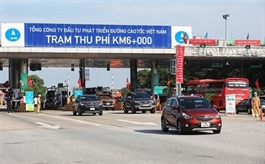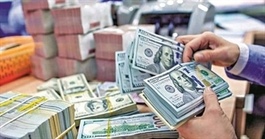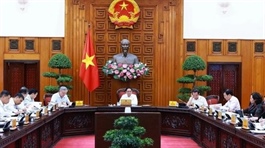Capacity expands to lower deposit and lending rates
Capacity expands to lower deposit and lending rates
The recent decline in exchange rates will provide the State Bank of Vietnam with more room to adjust interest rates in a way that benefits credit growth and stimulates economic expansion.

Following the decision to cut interest rates by 50 basis points in last week’s Fed meeting, as of the announcement on September 26, USD prices at commercial banks in Vietnam significantly dropped to 23,400-25,290 VND/USD for selling rates. The central exchange rate set by the State Bank of Vietnam (SBV) also decreased to VND23,400-25,290 for a US dollar.
“The Fed’s rate cut will relieve pressure on monetary policies in various countries, especially developing ones like Vietnam. The SBV will have more room to flexibly manage policies to support economic recovery and stimulate growth, particularly by easing the recent pressure of rising interest rates,” said Dr. Vo Tri Thanh, a member of the National Advisory Council for Monetary Policies.
Economist Dr. Chau Dinh Linh noted that the Fed’s rate cut will have multiple positive impacts on Vietnam’s economy, particularly on monetary policy.
“It will help narrow the interest rate gap, reduce pressure on VND rates, and retain foreign capital in Vietnam, preventing it from flowing to other markets, especially the US,” Linh said.
Additionally, Vietnam’s foreign currency reserves are expected to remain strong, buoyed by positive export growth and a robust inflow of remittances toward year-end, which will alleviate exchange rate pressures. The SBV may also seize the opportunity to purchase foreign currency to increase reserves, bolstering confidence in the domestic currency and attracting foreign investment, Linh added.
From a regulatory standpoint, Pham Chi Quang, director general of the SBV’s Monetary Policy Department, stated that changes in the Fed’s interest rates are a normal part of its publicly scheduled operations.
“Over the past year, the Fed’s aggressive rate hikes and maintaining high rates since 2022 have put significant pressure on exchange rates and interest rates globally, including in Vietnam. As the Fed reduces rates, these pressures are easing, as evidenced by the recent sharp drop in market exchange rates. In response, the SBV proactively lowered OMO and treasury bill rates to further reduce lending rates, supporting businesses and individuals and promoting economic growth,” Quang explained.
Suan Teck Kin, executive director of Global Economics and Market Research at UOB, noted that this was a good starting point for policymakers to assess ongoing developments.
“Despite the impact of Typhoon Yagi and a notable rebound in the exchange rate since July, we continue to expect the SBV to maintain its key policy rates for the rest of 2024, as the central bank monitors upside risks related to price pressures,” Kin said.
The SBV is likely to adopt a more targeted approach to support affected individuals and businesses in specific regions, rather than employing broad, nationwide tools such as interest rate cuts, he added. “As a result, we anticipate the SBV will maintain its refinancing rate at the current 4.5 per cent, focusing on loan growth and other support measures,” said Kin.
With the banking sector’s 15 per cent credit growth target for the year, banks will need to inject over $83.33 billion into the economy. However, according to data released by the SBV at a recent government meeting with commercial joint-stock banks on socioeconomic development last weekend, as of September 17, credit growth across the system had only reached 7.38 per cent, equating to nearly $41.67 billion in new loans.
Therefore, both the SBV and 13 commercial banks represented at the meeting concluded that, in addition to measures to stimulate consumption, lower interest rates would help boost borrowing demand from businesses. In this context, the Fed’s rate cut has provided flexibility for the SBV to adjust its policies.
Pham Quang Dung, Deputy Governor of the SBV, stated at the socioeconomic development meeting last weekend that the SBV will continue to ensure effective coordination with fiscal and other macroeconomic policies to promote economic growth, stabilise the macroeconomy, and control inflation.
“In addition, we will implement credit policies flexibly, in line with macroeconomic conditions and inflation trends, to facilitate access to bank credit for businesses and individuals. We will also continue to set annual credit growth targets for credit institutions, ensuring transparency and alignment with macroeconomic goals and the operational status of each institution,” Dung added.
Bank representatives also proposed several policy measures aimed at boosting national economic and social growth. “Vietnam must remain steadfast in achieving macroeconomic stability, controlling inflation, stabilising lending rates, and implementing proactive policies. These policies should be flexible, focusing on resolving difficulties for businesses, citizens, and banks” said Luu Trung Thai, chairman of MB Bank.
“Additionally, we need solutions to stabilise and streamline capital flows in the corporate bond market to reduce the pressure on medium and long-term credit in the banking system, while enhancing timely communication to maintain market and investor confidence,” Thai said.


























